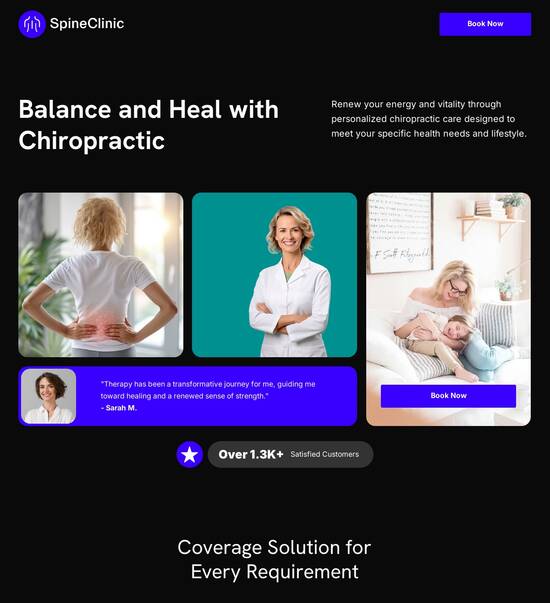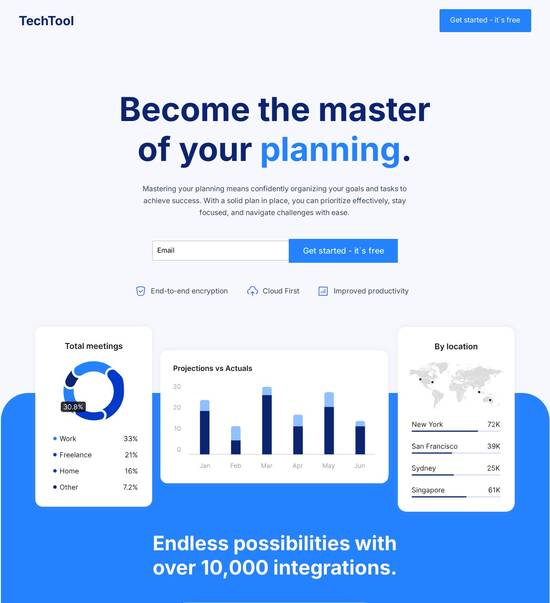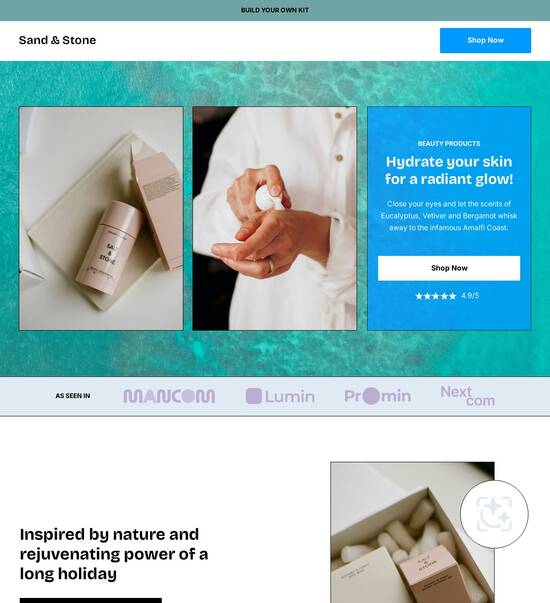
HTML page template for radiology centers
Use TemplateAbout template
Engage your audience like never before with stunning landing page templates for radiology centers. Make your online presence unforgettable!
Recommended templates

Easy to build without coding
With the intuitive drag-and-drop builder, anyone on your team can create high-converting pages without any knowledge of code or design. Make enhancements to your landing page with custom widgets using Javascript, HTML/CSS, or third-party scripts.

Multiple layouts for any industry and goal
Select from 500+ landing page layouts built to boost conversions across industry-specific scenarios. Customize them by adjusting fonts, adding images, and generating on-brand content with the AI assistant. Quickly scale with Instablocks® and Global Blocks that you can save, reuse, and update globally.

Loads fast and looks polished on any device
Every template is responsive, which means they present professionally on any device and load blazingly fast with our Thor Render Engine. You can also power them up with Google AMP technology to deliver an unparalleled mobile experience and drive higher conversions.

Robust analytics & experimentation
Get real-time updates and reporting across all your devices, showing the number of visitors, conversions, cost-per-visitor, and cost-per-lead. Launch AI-powered experiments, run A/B tests, and use heatmaps to analyze user behavior, then optimize your landing page to maximize conversions.







Easy to build without coding
With the intuitive drag-and-drop builder, anyone on your team can create high-converting pages without any knowledge of code or design. Make enhancements to your landing page with custom widgets using Javascript, HTML/CSS, or third-party scripts.
Multiple layouts for any industry and goal
Select from 500+ landing page layouts built to boost conversions across industry-specific scenarios. Customize them by adjusting fonts, adding images, and generating on-brand content with the AI assistant. Quickly scale with Instablocks® and Global Blocks that you can save, reuse, and update globally.
Loads fast and looks polished on any device
Every template is responsive, which means they present professionally on any device and load blazingly fast with our Thor Render Engine.
Robust analytics & experimentation
Get real-time updates and reporting across all your devices, showing the number of visitors, conversions, cost-per-visitor, and cost-per-lead. Launch AI-powered experiments, run A/B tests, and use heatmaps to analyze user behavior, then optimize your landing page to maximize conversions.
All the features you need to build radiology website design
Explore more featuresLearn how to build html css
Frequently asked questions about health care facilities
Leading the way in building high-performing landing pages





Types of health services: Your ultimate how-to guide
Creating a high-converting landing page is essential for marketers seeking to capture leads effectively. Instapage offers an all-in-one landing page and CRO platform that provides marketers with the necessary tools to not only accelerate their campaigns but also optimize and scale them to maximize ROI. The simplicity and flexibility of the platform allow for rapid deployment of landing pages tailored to various audiences.
Essential features of landing page creation
To maximize the effectiveness of your landing pages, leverage Instapage's capabilities that foster rapid development and optimization. Key features include:
- Pre-built templates: Choose from over 100 conversion-focused designs that save time and ensure effectiveness in lead generation.
- Drag-and-drop builder: Empower your team to create custom pages easily without programming knowledge, allowing for greater collaboration.
- A/B testing tools: Test different versions of your landing pages to identify what resonates best with your audience.
Optimizing for conversions: The first step
Optimizing landing pages requires understanding audience behavior and preferences. Utilize Instapage’s built-in analytics to make data-driven decisions. Here are tools to consider:
- Heatmaps: Visualize how users interact with your pages, helping identify areas for improvement.
- Conversion tracking: Measure the success of your campaigns to ensure you focus on effective strategies.
- Personalization options: Use dynamic content to tailor experiences for different segments.
Collaborative improvements: The second step
Enhancing landing pages through collaboration is crucial. Instapage's collaboration features enable teams to work together efficiently, facilitating real-time feedback and edits. Consider these approaches:
- Instant feedback: Utilize comments and suggestions directly within the platform to streamline the review process.
- Version control: Keep track of changes made by different team members, ensuring clarity during collaboration.
- Stakeholder sharing: Easily share drafts with external collaborators for quick input before launching.
Measuring success: The third step
After launching your landing pages, continual measurement of their performance is vital. Use Instapage’s analytics dashboard to track and refine your strategies. Important metrics include:
- Bounce rate: Identify pages that aren't retaining visitors, prompting necessary adjustments.
- Lead conversion rate: Analyze how well your pages are converting visitors into leads.
- Traffic sources: Determine where your most valuable traffic is coming from to optimize marketing efforts.
By utilizing Instapage’s powerful features, marketers can significantly enhance their digital strategies through optimized landing pages.
Start leveraging Instapage today to transform your approach to landing pages! Try out the platform’s free trial to get a hands-on experience.
HTML page template for radiology centers
Understanding the unique needs of radiology centers
Radiology centers serve a crucial role in the healthcare ecosystem by providing diagnostic imaging services. These facilities focus on procedures such as X-rays, MRIs, and CT scans, all of which are essential for accurate medical assessments. A well-functioning radiology center not only conducts imaging services but also collaborates with healthcare providers to interpret results, ensuring the best patient outcomes.
Patient engagement and education are pivotal in radiology. Patients need to understand the purpose and process of their imaging procedures to alleviate fears and anxiety. Thus, an effective HTML page template should facilitate easy access to information about various services, empowering patients to feel informed and supported throughout their healthcare journey.
Specific challenges faced by radiology centers
Radiology centers encounter various challenges when it comes to patient care. One of the most pressing issues is patient anxiety regarding procedures. Many individuals feel apprehensive about undergoing diagnostic imaging, especially if they are unfamiliar with the technology or process involved. Addressing these concerns through patient education can significantly improve their overall experience.
Additionally, the complexity of medical terminology can be a barrier for many patients. Clear communication is essential for explaining procedures and results in layman's terms, reducing confusion and fostering trust in the healthcare system. Timely and accurate information delivery is another critical aspect; delays and miscommunications can severely impact patient care and satisfaction.
The essential role of an HTML page template
Establishing a dedicated web presence is vital for radiology centers. A well-designed website serves as the first point of contact for patients and can significantly impact their perceptions and level of trust in the center. A professional and informative website can convey credibility and enhance the overall patient experience, leading to increased patient loyalty.
The evolution of digital solutions, particularly between 2007 and 2025, has been rapid, with patients increasingly relying on online resources for information about their health. This shift necessitates that radiology centers embrace modern web technologies to stay relevant and meet patient expectations.
Streamlined communication with patients ensures they receive prompt answers to their queries.
Enhanced service promotion allows radiology centers to educate patients about their offerings.
Integration of essential features tailored for radiology, such as appointment scheduling, FAQs, and patient education resources.
Core features of an ideal HTML page template
User-friendly design elements are paramount in creating an effective HTML page template for radiology centers. A clean navigation structure enables users to find information quickly, while accessibility features can accommodate diverse patient needs, ensuring that everyone, including those with disabilities, can access important information.
A responsive design is another essential aspect, as patients increasingly access websites via mobile devices. An adaptable layout ensures that users can navigate the site comfortably, regardless of screen size, thus improving their experience.
SEO optimization capabilities
Optimizing an HTML page for search engines is crucial for visibility in an increasingly competitive digital landscape. Incorporating XML sitemaps helps search engines index the site's content effectively. Additionally, adhering to metadata best practices can enhance the discoverability of healthcare-related content.
Using relevant keywords associated with radiology procedures—like MRI, CT scan, and ultrasound—can attract more traffic. This strategy positions the radiology center as a trusted source of information, encouraging patients to visit the website for their healthcare needs.
Privacy and compliance considerations
In the healthcare field, privacy and compliance cannot be overlooked. Incorporating clear privacy policies that comply with regulations such as HIPAA is essential for any radiology center. This ensures that patient information is handled securely and responsibly.
Offering secure patient portals for accessing personal information fosters transparency and trust. It's also important to communicate the rights and responsibilities regarding patient data usage, which strengthens the center’s commitment to protecting personal information.
Template layout and functional features
The homepage serves as the face of the radiology center's online presence, so it should include key elements such as highlights of services offered, specialties, and accessible contact information. This layout encourages quick access to patient education resources that alleviate anxiety and foster understanding.
Additionally, clear callouts for emergency services or urgent care can significantly enhance patient safety by providing immediate access to critical information during pressing times.
Service pages for comprehensive information
Creating detailed service pages assists in educating patients about various imaging services like MRIs and CT scans. Including FAQs that address common concerns or queries can empower patients by providing them the information they seek to feel prepared and informed.
Moreover, showcasing patient testimonials and case studies can build trust and demonstrate the effectiveness of the radiology center's services, encouraging new patients to schedule appointments.
Patient resources and tools
An online appointment scheduling feature is invaluable, allowing patients to book visits conveniently and receive reminders for their appointments. Furthermore, interactive forms for pre-visit requirements streamline administrative processes, making it easier for patients to navigate the initial stages of their care.
Providing downloadable resources such as consent forms and preparation instructions helps ensure patients are well-informed before their visits, promoting a smoother overall experience.
Blog/news section for continuous engagement
Maintaining a blog or news section allows radiology centers to engage patients with educational content. Sharing information about advancements in imaging technology, health tips, and wellness news can position the center as a thought leader in the field while keeping patients informed.
Additionally, regular updates about the center's operations, such as new services or changes in hours, ensure that patients have the most current information readily available.
Customization and scalability of HTML page templates
To develop a strong brand identity, it is essential to adjust visual elements within the HTML page template to match the radiology center's branding. This includes selecting cohesive color schemes, logos, and imagery, which create a seamless experience for users across different platforms.
Furthermore, scalability should be a key consideration when selecting a template. As radiology centers grow and services evolve, it is crucial that their web presence can easily adapt. This includes the ability to incorporate new services and innovations as they arise and the flexibility to integrate additional plugins for enhanced functionality.
Analytics and performance tracking
Utilizing analytics tools is fundamental to understanding patient interactions and engagement with the website. By tracking visitors’ behavior, radiology centers can gather insights into what content resonates with patients, allowing them to make informed decisions regarding website improvements.
Important metrics to evaluate website performance include page views, bounce rates, and conversion rates. Monitoring these metrics will enable centers to identify strengths and weaknesses, thereby improving the overall online experience.
Feedback mechanisms
Implementing surveys to gauge patient satisfaction can provide invaluable feedback. This information allows radiology centers to directly address common pain points and improve on services based on real customer experiences.
Incorporating feedback into ongoing website iterations helps radiology centers continue to tailor their offerings to meet patient needs effectively.
Iteration based on performance
By leveraging data-driven insights, radiology centers can tweak their website content based on user behavior. This includes adjusting messaging, and layouts, and even adding new resource sections to reflect the needs and preferences of their patients. Continual evolution of the website based on analytics ensures that the digital presence remains relevant and engaging.
Case studies and success stories
Several radiology centers have successfully embraced innovative website features to enhance patient engagement and education. For example, a center that implemented an interactive FAQ section observed a significant decrease in patient anxiety related to procedures, reflecting improved overall satisfaction.
Additionally, lessons learned from these initiatives emphasize the value of incorporating patient testimonials, as they can provide social proof and set realistic expectations for prospective patients.
Testimonials from radiology center administrators
Administrator testimonials highlight the positive impact that improved web templates have had on patient feedback and overall engagement. Many reported increased efficiency in appointment scheduling and a noticeable uptick in patient inquiries through the website.
These insights can provide future radiology center administrators with strategies to enhance their digital presence and address patient concerns more effectively.
The future of digital presence in radiology
Emerging trends in website design and functionality suggest a shift towards a more user-centered approach. By 2025, we anticipate that radiology centers will need to adopt more intuitive layouts, incorporate advanced technologies such as AI chatbots for immediate patient support, and streamline online service access to meet evolving patient expectations.
The role of HTML page templates in telemedicine is also expanding, as they enable radiology centers to facilitate remote consultations and access to diagnostic services from the comfort of patients’ homes. This digital-first approach will likely redefine patient experience as centers adapt to the increasing demand for convenience and accessibility.
Final reflections on choosing the right HTML page template
Before implementing an HTML page template, radiology centers must analyze their specific needs carefully. This analysis should involve understanding the target audience's expectations, which can vary significantly from one community to another.
A commitment to continuous improvement and flexibility in adapting to feedback, regulatory changes, and technological advancements is essential for future-proofing the online strategy. By prioritizing these factors, radiology centers can enhance their digital presence and patient engagement for years to come.
Ready to skyrocket conversions?
Supercharge your ad campaigns with high-performing landing pages
Get started














